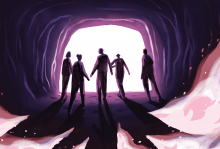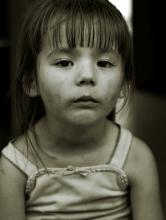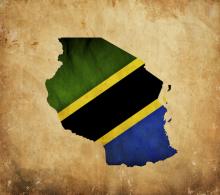sickness

“To be loved, baby, hard, at once, and forever, to strengthen you against the loveless world. Remember that: I know how black it looks today, for you. It looked bad that day, too, yes, we were trembling. We have not stopped trembling yet, but if we had not loved each other none of us would have survived. And now you must survive because we love you, and for the sake of your children and your children’s children.”
— James Baldwin,
The Fire Next Time
I ENTERED THE doctor’s office, met by the smiling face of the receptionist. “May I help you?” she asked, as I tried to maneuver my lips to smile to cover how terrible I was feeling. “I need to get tested.” She didn’t ask me what test I needed, or where I had come from, or what I was feeling. She checked me in and pointed me to the waiting area—a cold and lonely and familiar place.
I wondered if they knew how terrified I was for me, for my wife, for my son, for our baby not here yet. I wondered if they knew that my body was on fire, that my mind kept alternating between anger and regret for letting my friend in the house with no mask. I wondered if they knew how my stomach emptied the chopped carrots, old celery, and the warm chicken noodle soup into their clean toilet.
“Danté Stewart,” the nurse called out to me, “right this way.” I could hear my heartbeats through my ears as I took the steps through the cold and lonely and familiar clinic. She called in the other nurse. They took my pulse. They put the little white and blue device with the red numbers on my left middle finger. 97. Good. 106 bpm. My heart is racing. As I felt the blood pressure cuff tighten its grip on my arm, the nurses gave that look.

SOON AFTER Dr. Michael Hendryx assumed a professorship of health policy management at West Virginia University, he started hearing stories of sick people in Appalachian communities near mountaintop removal coal mining operations. Finding no scientific research that examined the correlation between mountaintop removal and community health, Hendryx and his colleagues began overseeing family health surveys and compiling health data from the Centers for Disease Control and Prevention.
Since 2011, Peter Illyn of Restoring Eden (Christians for Environmental Stewardship) has recruited and led student volunteers from Catholic and evangelical Christian colleges in conducting door-to-door community health surveys for Hendryx’s research. Typical volunteer experiences, according to Illyn, include “aha” epiphanies and deepening conversions to God’s justice. Alex Gerrish, a recent Samford University (Birmingham, Ala.) graduate, recalls a searing experience. Her survey team visited a home located close by two mountaintop removal (MTR) operations, where a mother answered the door. She said, “I’m trying to get my son down for a nap,” explaining that her two-year-old had a heart defect. “Now’s not a good time to talk.” Two days later the team revisited the home to be met by an older, tear-stained woman. “I’m sorry,” she said. “My grandson passed away a couple days ago.” He never woke up from his nap. As Gerrish stood in shock, she recalled the statistics on high birth-defect rates in communities with mountaintop removal operations.
Now, more than two dozen published peer-reviewed studies show a high correlation between populations living amid MTR operations and very high rates of morbidity, asthma, chronic obstructive pulmonary disease, heart disease, cancer, and birth defects.

I spent an entire day a couple of months ago in an outpatient clinic (I'm fine; thanks for asking). I met a lot of nurses, and every one of them was excellent.
When Velda came to take away the remains of my lunch, I offered her my untouched can of ginger ale.
"I don't drink soft drinks," she replied. Since I rarely do either, we started chatting.
Velda grew up in Tanzania, moved to Belgium, spent several years in London, and finally came to the United States. She returns to Tanzania regularly, and she is not happy with what she sees.
"I grew up eating lots of vegetables," she told me. "We might have had ice cream once every three years. But now people are eating American-style junk food. They don't know it's not good for them."
Climate scientists have warned that climate change will bring about—and already is bringing about—more frequent and fiercer storms. But climate change leads to far more than just destructive weather patterns, with consequences in almost all aspects of our lives. Here are just a few of the many possible effects of our rising global temperature.
Natural disasters will increase.
Climate change increases the risk of natural disasters that disproportionately affect low-income people who lack the resources to prepare, recover, or relocate.
Food will be scarcer and more expensive.
Food prices increase as farmers face new levels of unpredictability in weather patterns. Drought and floods may cause widespread soil infertility and increased plant diseases.
We'll experience more drought—and floods.
Changes in weather patterns lead to both increased drought and flooding, because warmer air can hold more water. Many dry places will become drier, while others will be inundated with rain.
It had been more than a week since the doctors had moved me into the ICU, and more than a week since I had tasted anything liquid.
My tongue was dry and felt like leather. At night, I would watch the machines around me blink. The IV bags hung next my bed and scattered the light across sterile white walls.
 I tried not to cry when I could no longer control my bowels. I lay there in my own filth waiting for a nurse to rescue me.
I tried not to cry when I could no longer control my bowels. I lay there in my own filth waiting for a nurse to rescue me.
I came into the world unable even to clean myself and now it seemed I would leave it in the same state.
Finally the nurse arrived to help me.
“I’m thirsty,” I told her. “May I have an ice cube?”
She said no.
“Please? My mouth is so dry. Just an ice cube,” I begged.
“No.”
Oxygen tubes inserted into my nostrils had rubbed my nose raw. I pulled them out.
I felt relief. I watched the numbers drop on the LCD screen. An alarm sounded.
I tried to put the tubes back when the nurse ran in.
“Mr. King, you need the oxygen,” she chided, skillfully replacing al the tubes and checking all the machines and medicines that flanked my hospital bed — all the things that were keeping me alive.